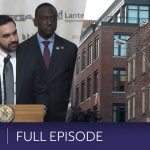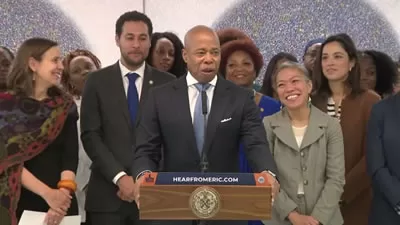Mayor Eric Adams: You like that song, don’t you? That was the long version.
Deputy Mayor Fabien Levy, Communications: Good morning, everybody. My name is Fabien Levy and I serve as deputy mayor for Communications for the City of New York. We hope everyone’s holiday season is off to a good start and appreciate you all joining us today for our weekly in person media availability.
This morning, the mayor has once again convened senior leadership to answer your questions and address issues that are top of mind of everyday New Yorkers. Providing people with a clear line of sight into the work of their city government has been a focus from the very beginning of this administration and it always will be.
So, joining us today, we have Mayor Eric Adams, First Deputy Mayor Sheena Wright, Chief Advisor to the Mayor Ingrid Lewis Martin, Deputy Mayor for Operations Meera Joshi, Deputy Mayor for Housing, Economic Development and Workforce Maria Torres Springer, Deputy Mayor for Health and Human Services Anne Williams Isom, Deputy Mayor for Strategic Initiatives Ana Almanzar, Chief Counsel Lisa Zornberg, New York City Emergency Management Commissioner Zach Iscol and New York City Mayor’s Office of Management and Budget Director Jacques Jiha. So, without further delay, Mayor Adams.
Mayor Adams: Thanks. Thanks so much, Fabien, and really the whole team for being here this morning. I just really want to start by thanking our first responders: FDNY, OMB, NYCEM, NYPD, DOB and the response to the building collapse. Yesterday, a partial building collapsed. I think our guys and ladies were there under two minutes.
And this is coming off of an extremely busy weekend for Zach. Commissioner Iscol was monitoring the storm and we thought we were going to be dealing with some extreme winds and rain and he was all over the city. But just to see that repeated response during the… Anything could happen in a big city, New York, and I just want to take my hats off to them on how they responded.
And fortunately, for us, that we were able to dig through the pile, which is a very dangerous part of the operation. I’ve responded to tragedies like this in the past and not find one person who was injured. It was just remarkable when you think about it because there was an active bodega that was on that corner, and just to see that no New Yorkers lost their lives, two New Yorkers received non life threatening injuries.
Kudos to just say an amazing first responder team that we have in the City of New York. So, we’re still looking into the cause of the collapse; once we have a final analysis, we will report it to you and let you know.
Also, yesterday we were really, really pleased in announcing something that our team, Deputy Mayor Almanzar and Deputy Mayor Wright, who started off the initiative, our “Pathways to an Inclusive Economy and Action: Plan for Young Adult Career Success”, $600 million to prepare 250,000 young people for our workforce.
This was an amazing, amazing announcement. Sorry I didn’t read about it, but you know, we are excited about it. And DM, you can go into that and some of the things that’s going to come out of that plan. Okay.
Deputy Mayor Ana Almanzar, Strategic Initiatives: Thank you, mayor, and good morning, everyone. Yesterday we announced the release, the action plan to help 250,000 young New Yorkers to be able to launch a career in different pathways.
It has been the goal of the administration to help our children achieve the career of their dreams. That’s why we expanded Summer Youth Employment Program and Summer Rising in 2022 and 2023 with record numbers — 100,000, 110,000 respectively — in the hopes that our children will see and expand the opportunities that they see in the New York City Public Schools.
We also launched the FutureReadyNYC with Google and Northwell Health in helping our young people get into the tech industry in those demanding jobs for the career of their futures.
Also, we have a couple of investments in that action plan that the mayor mentioned. We have a $10 million investment in CUNY to expand CUNY 2X tech initiative across five new campuses throughout the city. For the first time, going to some community colleges. As you know, I’m a proud Hostos Community College graduate at CUNY, and that is the same vein to develop the tech industry for our young folks.
We have also secured a $130 million grant from the federal government and we’ll become the first city to partner with the U.S. Department of Labor with the program Job Corps. And we’re hoping we would be willing to help about 2,000 young students to be able to get internship and apprenticeship and work in a fast industry and ever changing economy in New York City.
Our city’s future, as we all know, rests in the work that we do today to help our young people enter, contribute and ultimately thrive in our ever changing economy. And I am very proud to say that New York City’s future is brighter than ever, and it is our hope that our youth will see this action plan as the indication of the health of our city that under Mayor Eric Adams, the future of the city is in great, great shape. Thank you, Mayor Adams.
Mayor Adams: Thank you. Could I trouble you for one of your cough drops?
Deputy Mayor Almanzar: Of course, yes. I brought a couple of them.
Deputy Mayor Maria Torres-Springer, Housing, Economic Development and Workforce: Anyone else?
Mayor Adams: All yours, Fabien Levy.
Deputy Mayor Levy: All right. Thank you. We’ll take some off topic questions.
Question: Mr. Mayor, you have probably among the most unpopular budget cuts that the city has seen in a long time. And yesterday, the City Council said that they found $1.2 billion in extra tax money.
And I’m wondering, given the fact that you are a former police officer and care desperately about public safety, are you thinking of using that money to rescind some of the cuts, the Police Department, the Fire Department, libraries and Sanitation, other things that will deal with the quality of life in New York City?
Mayor Adams: Some of the analysis and readings that I’ve looked at talked about how we got in this mess in the first place, and it’s overspending. We had almost a perfect storm. We had municipal contracts that were not settled in years, some 13 years, some eight years.
We had Covid dollars that are running out. We were propping up permanent programs with temporary dollars. That’s just unimaginable. And then we had the asylum seeker crisis and our economy. And so it was just a perfect storm.
And so one would look and say, okay, we have a different prediction on the dollar amount, $1.3, $1.4 billion. We’re looking at a $7 billion budget deficit that we have to fill in January. You don’t fill it by doing the things you did incorrectly in the first place.
I’ve always made it clear we have to be more efficient in running our city agencies and more efficient in protecting taxpayers’ dollars. And so Jacques is doing an amazing job of navigating us through this financial storm, and we’re going to look at what programs we can save, how we could get a better return on taxpayers’ dollars investments. But this is going to be a painful moment and we have to get it right.
Question: So, are you saying the fact that you’re going to look at taxpayers at things that you can save, what’s the top of the list, [inaudible] saving the police cuts, the fire cuts. I mean, you’re basically saying that maybe you’re going to pull back from some of those things that have upset the public?
Mayor Adams: No, I did not say that. No. We are going to analyze how to close the $7 billion budget gap. That’s what we’re going to analyze. And I made it clear, I almost turned it into a slogan: public safety is a prerequisite to our prosperity. We can’t do anything in this city if we’re not safe.
And we must invest in our children because if we don’t educate, we will incarcerate. You know, I just like these one liners that we all hold on to. And so our children and our safety is at the top of the list, and whatever we can do to minimize those areas, we’re going to continue to do so. Jacques, did I miss anything that you want to add on to?
Jacques Jiha, Director, Office of Management and Budget: No, Mayor. No, I’m sorry. I think one point we need to clarify… One point we need to clarify is that even after the $3.7 billion of savings that were generated from the PEG program, we still have a $7 billion gap.
So, assuming that the council is right, okay, we move one and a half from that seven, you still have $5.5 billion worth of gap that we still have to close, okay? So, again, you know, we have not done a forecast yet at this point in time, and I’m assuming and I’m hoping that they’re right, we could get these additional revenues, but revenue itself cannot solve this problem.
Question: So, you’re saying you’re not going to do any… You’re not going to be able to save any of the cuts?
Jiha: No, look, what I’m saying is given the size of the magnitude of the problem, that $1.5 billion would not by itself help us solve the problem, because we have to solve, we have to close the gap to begin with in 37 days… In 36 days, actually, okay, we have left. So, $1.5 billion won’t be enough, okay, to help us close the gap.
Deputy Mayor Levy: Jacques, can I jump in there? One thing for the next round, you and the mayor have decided that the Police, Fire, Sanitation won’t have cuts. So, that’s something. Remember, Police, Fire, Sanitation won’t have any cuts in the next round of the PEG.
And then I would also point out, Jacques said something and the mayor said something back in August that the asylum seekers costs that we have, the $12 billion over three fiscal years, that’s assuming things do not change. The state and the feds have not given us what we need, but we are now making changes to help offset some of these costs.
So, Jacques’s team is doing a new analysis and all of that. But that’s why when you guys ask us about 30 days and 60 day notices, that’s a program that we have now implemented. And maybe DM Anne can talk about the success of it a little bit more, but that’s specifically what we have done to help offset the situation.
Deputy Mayor Anne Williams Isom, Health and Human Services: I’m sure we’ll get asylum seeker…
Question: Mr. Mayor, on the radio on Sunday, you said, I’ve done nothing unethical or illegal, but despite all this, there are powerful individuals who care more about politics than people. I’m in their way, so they attack and they smear and they try to tear us down.
Mayor Adams: Um hmm.
Question: Who’s attacking, who’s smearing, and why did the feds ask to look at your cell phone, then?
Mayor Adams: Well, listen, I’m not going to go into the reviews that are done. I think that some of the folks who are calling you guys on the weekends and yelling, you know, what’s happening to Eric and what’s going to happen to Eric, that’s feeding this.
I’m focused on navigating this city. And there’s people who know me, they know I have one attribute that I’m really proud of: how to put issues in compartments. My successful ability throughout my professional life of always having things going on and can stay focused. My tagline, “stay focused, no distractions and grind” is what I live by. And so when you get those calls, and I’m not sure if you were one of those that got the calls over the weekend.
Deputy Mayor Levy: I got the calls. I got the call.
Mayor Adams: Yes. Yes. You know…
Deputy Mayor Levy: Some of you can raise your hand if you want to…
Mayor Adams: I’m pretty sure all of you did. So, there are those who are political opportunists that from the day I was elected, no matter what we did, they did everything to try to derail our city. And they’ve been consistent in it, and we know they’ve been consistent in it.
And I’ve said this more than once long before this whole Turkish conversation came up. There are people who wake up every day and say, how do I get the pilot of this plane to crash? These guys are on the plane. I don’t know how many times I can say this. People should be praying for me to land the plane.
And I’m focused. I got a great team. We know our mission. And I think the greatest indicator of how focused we are, do you guys realize 86,000 of the over 150,000 migrants and asylum seekers have been stabilized, moved out of our system? Over 50 percent of them? You’re talking about with no help from the federal government.
So, when I hear people keep saying Eric is distracted, Eric is distracted, don’t hope for me to just be distracted. I’m a steady hand at the wheel. And there are those in this city that I believe have their own political agenda and not the agenda of the people of this city.
I have the agenda of the people of this city. This is the city that I protected as a police officer and I still love very much and I’m still going to be committed to serving them. And that’s who I’m talking about, Nolan.
Question: Mr. Mayor, on the radio show…
[Crosstalk]
Question: …you seemed to [inaudible] on the question…
Mayor Adams: Hold on. Hold on. Hold on. No, I want to hear this, because I don’t want him misinterpreting…
Deputy Mayor Levy: Can I, just before, I just want to add in, just, it was 83,000. Just want to be fully clear about the numbers, 83,000 have left, 56 percent.
Mayor Adams: 83, thank you.
Question: Understood. On the radio show, you seemed to intertwine the federal investigation into your campaign and opportunism by your political opponents. Do you believe that federal prosecutors are among your opponents?
Mayor Adams: Okay. And so what you said was very important. You said you seem to do this. Okay? So, that’s why we have these off topics so you don’t have to interpret what I said, and I explained what I said.
So no, I think the federal authorities are doing their job and I think those who are political opportunists are doing what they think they want to do, and that’s to hurt the success of this administration. Two different entities. Okay?
So, you don’t have to say “I believe you were saying this, Eric.” That’s why we do these off topics, so we could take time, we could breathe well, we can interact with each other. So, that’s what I was saying. Okay.
Question: Do anything…
Mayor Adams: I gave you two, Nolan. I gave you two. I gave you two.
Question: Mr. Mayor, back to the budget.
Mayor Adams: Yes, ma’am.
Question: Given that migrant care is a huge expense that’s not going to go away any time soon, given that you can’t count on federal or significant state money or federal money, where are you going with these budget cuts? What else is on the table? Are you looking at layoffs? Are you looking at tax increase? Where does it end?
Mayor Adams: You know, that is “the” question. You know, we stated last year, we saw this coming, Jacques and the team, we talked about this. And that’s what’s so frightening about this. I saw it down in South America when I saw the level of people who were coming here, the continuous destabilization of Venezuela, what we’re seeing in Ecuador with the crime problem and people are leaving there.
If we don’t have a real national response — and we’re seeing what Governor Abbott is doing intentionally, intentionally saying I’m going to send 25,000 to New York — we could, you know, we’re going to reach a very, very drastic period in this city, very, you know, very harmful.
Question: What do you see that as…
Mayor Adams: Well, we’re already there. We’re already there. When you look at the numbers that we have here, over 150,000 as we indicated, these are not mere numbers. And I don’t see the relief in sight coming from Washington. We’re going to need more help on the state during this budgetary season.
And do we want to get to the points of layoff? No. Do we want to get to the point of raising taxes on these small property owners? No. But remember by law, that guy down at the end of the table, he must balance the budget every two years by law. There’s a certain amount of money that comes in, we have to pay the bills going out. That’s by law. So, November, we have to do the November plan, January, we have to do another plan. And we have a $7 billion hole.
Question: So, do you have any other revenue stream or any other option other than more cutbacks, other than increase in taxes? What other options do you have?
Mayor Adams: Well, you know, I’m going to hand that to Jacques so someone won’t get upset with me again. I could blame Jacques. Jacques, tell us our streams that we have.
Jiha: What we’re trying to do right now is as best as we can, is trying to manage down the census. That is the key here. And we have to bring down the census. No matter how many people are coming, we got to get as many people out of the system as quickly as possible. Okay?
So, that’s the reason why we are implementing policies such as the 30 days, 60 days. So, we could get as many people to move out of the system as quickly as possible so that in case there’s a big surge of people coming in, we could create room for them so that we could manage at least try to stabilize the census.
So, we are implementing a PEG of 20 percent on the census… On the asylum seekers budget so we could manage down the expense. And I think we still have room to go in terms of PEG ing the asylum seekers’ budget for the simple reasons that we’re currently, the per diem in our view is a bit too high because that was a per diem set because of the emergency contracts and all of those things.
So, we are moving from those things now that we have the long runway. You know, we learned from previous experiences, so we are going to try to implement those things. So, again, the goal now is bring down the census, manage down the cost as best as we can. We’re going to continue to provide care to the asylum seekers, but it doesn’t have to be as generous as we have been in the past.
Mayor Adams: And keep in mind, when you talk about the real W’s with Deputy Mayor Williams Isom and her team, over 80 percent of those we gave the 30 day notices did not come back. People were yelling, this is inhumane. What are you doing? Over 80 percent. When we said, listen, New Yorkers can only do this for 30 days, over 80 percent were able to sustain themselves.
And so that’s why other cities are looking at what we have done. And I don’t know if it’s lost on everyone, just look at the numbers. Over 50 percent of those who went through the system are self sustaining now, over 80 percent that we gave a 30 day policy did not come back. Not one child or family is sleeping on the streets, unlike other municipalities sleeping in precincts, sleeping in tents.
You know, so I’m just really baffled when I hear people say, well, Eric, you can’t manage the problem. What? I’ve managed the hell out of this problem. You know? And others are looking at what we are doing. They call us all the time and say, how the heck are you guys able to manage what you have done? We’ve managed this problem better than any other municipality.
Question: Hi.
Mayor Adams: How are you doing?
Question: I’m well, sir. How are you?
Mayor Adams: Good.
Question: So, Mr. Mayor, just a couple of things. The first thing you mentioned with Deputy Mayor Almanzar about youth programs.
Mayor Adams: Yes.
Question: So, it’s come to my attention that there is a program called Assistant School Safety Agents that was approved by Chancellor Banks, that was approved by Commissioner Caban.
And this program is going to employ 18 to 20 year olds, put them on the path to a career in civil service and of course, all of the benefits that come with being a union member. But there’s a delay with the hiring because they’re waiting on the DCAS temporary hiring code. So, thank you for that because our youth need programs like this, and this is really going to help with school safety in our schools, especially our elementary schools.
But Mr. Mayor, what is the delay with the DCAS hiring code because everything’s been approved, everything’s been budgeted, allocated. What is the delay? So, that’s question number one.
Question number two. Back to school safety. Mr. Mayor, last week when I asked you a question with what happened at Murrow, which we just learned that Murrow has the second number of highest crimes, all crimes for this school year, so they do need scanners. But you mentioned that, you know, there are people, young people and parents who, you know, don’t want scanning, although every single TV interview with the student and a parent last week said they want scanning.
But what you did not share, Mr. Mayor, was that there has been an approval by, again, Commissioner Caban and Chancellor David Banks to get new scanners, not invasive scanners, called open gate scanners.
And my understanding is everything has also been approved and we are waiting on, and I’m glad Mr. Jiha is here, OMB approval for the less invasive scanners which is wonderful because the kids just walk through, they don’t have to take off their bookbags. The company CEIA — C E I A — is a well known company. So, my question is also for Mr. Jiha, DOE, NYPD is waiting on OMB approval but everything is approved.
And also, last but not least, thank you, school safety agents are getting their bulletproof vests on Thursday and we will be there. Thank you from all of those mothers, mostly Black and brown women who are…
Mayor Adams: Thank you. Thank you.
First, the program is an excellent program with the school safety agents, because we’re having a problem of retention with school safety agents. And so I thought the program by the chancellor and the police department was a brilliant program.
Jacques is going to look at exactly the feasibility of… Because we do have a hiring freeze. We have a hiring freeze not because we don’t have vacancies, it’s because we have a financial problem. So, Jacques has to make that determination.
And those scanners that you’re talking about, those are the scanners that I sent out my team to find, non-invasive scanners, you know, because I believe in technology. And so the goal is to make sure we have the money to purchase these items.
All of our agencies, they all have wish lists, all of them. And all of them are looking at some of the things that we want to move forward to make the city safer, more efficient and able to run better. But we’re dealing with financial restraints, and Jacques has to make the determination on these things that we want to do and can we move forward with that.
Jiha: Let me give you an update. They have been approved because we’re trying to find out, to see whether or not they were covered or eligible. Okay? That’s a process as part of the review process. But as of this morning, they were approved.
Question: Thank you.
Mayor Adams: You’re quite welcome.
Deputy Mayor Almanzar: Oh, and real about the question on the police commissioner and the work with the chancellor, is the idea for the mayor that we all work together, all the agencies looking at youth programs and how we can combine all of our resources in training our youth to be able to get into the industry they haven’t been able so before.
Question: Mr. Mayor. Hi, Happy Hanukkah.
Mayor Adams: How are you? Same to you.
Question: Thank you. On the Bronx building, one on that issue, one on building inspections in general. On the Bronx building, we have a high number of displaced people. Can you update the resources the city’s bringing to bear to help those people?
And then big picture. We’ve had maybe in the last six to eight months a lot of high profile private building collapses: the garage, this apartment building, the crane, wide ranging series of issues, but it all goes back to this question.
Are you considering any sort of policy change or legislation to have private industry, which largely inspects itself, pays for its own inspections and then loops in DOB, are you considering any sort of change to that following these high profile collapses?
Mayor Adams: Two things. One, I don’t know if our numbers are larger than “normal,” if there’s such a turn as “normal.” Every collapse is a bad collapse. But many of our buildings come from an older stock, and so you have this from time to time. Thank God we didn’t lose any lives. If you were there and you saw that building, it’s miraculous that we did not lose lives and thank God we didn’t.
But I believe in the concept of having outside individuals that are bonded, certified, go through the necessary approval. I believe in the concept, working that through, operationalizing that. We have to be careful and make sure we do it correctly.
You know, but the concept of making sure that we can get those private entities to do so is something that I’m willing to look at and examine, and we could do it and make sure that it’s done safely.
Question: And then on the resource the city’s bringing to bear to help the high number of individuals displaced by this.
First Deputy Mayor Sheena Wright: Zach is here.
Mayor Adams: Zach?
Commissioner Zach Iscol, New York City Emergency Management: Yes, I got it, sir.
Thanks for your question. You know, I think one thing just to start with, last night being out there with the mayor, one of things that he mentioned was just how lucky we are to have the folks who work for the city do what they do. Whether it was the crews that were out there all weekend or the folks that showed up last night.
So, as you know and as the mayor said, we had the FDNY arrived on scene in under two minutes. They started doing the search. And then after that, we kicked into a pretty comprehensive interagency response where you have Department of Buildings, HPD, MTA came out with four warming buses, DOE was out there to help us immediately open up two schools, one that we ended up using last night as a reception center.
And then, working with the Red Cross to locate folks around the city. And last night we relocated, we registered 37 of the households, that was 107 adults and 31 children. And then, of those households, 26 of them accepted housing. That includes 79 adults and 22 children.
We then moved that reception center today because we couldn’t be in the school — because the school needed to open up to to serve kids today — to Bronx Community College, Roscoe C. Brown Jr., Student Center at 2155 University Avenue. And that has been opened as of 10 a.m.
And we are working with the Red Cross, HPD, Buildings not only to find places for people to stay but also to shore up the building and see if we can eventually move people back in at some point, but there’s a lot of work that needs to be done before then.
Deputy Mayor Meera Joshi, Operations: Yes, and I can speak quickly on the city wide efforts. We’re a city of millions of buildings and 500 something inspectors, so we will never with boots on the ground get to every building. The tools that we have are the fines that we can impose for those that are not in compliance or failed to do work in a timely manner.
But we’re looking to sharpen those tools for sure. So there’s a scaffolding reform package that we’re working with council on, there’s been a garage reform package in the works. Underlying those tools is the ability to have escalating fines so it’s not the cost of doing business just to get by.
But one thing to note is the Building Department does not have the ability to put liens on buildings. So, what they can do is prohibit you from pulling certain permits. They certainly don’t want to prohibit you from pulling repair permits. But that’s one tool we have.
But without the ability to have liens on buildings, it is often difficult to collect those fines. So, ensuring that we have escalating fines so that they go up higher and higher is really one of the primary ways we can make an impact.
We’re dependent on the licensed professionals to do their job. If what they does not meet up to the license requirements, then we absolutely investigate them both through DOB on an administrative level, but working closely with the DA’s office and DOI.
Question: Is there any indication that was the case here?
Deputy Mayor Joshi: It’s an active investigation, but if that is the case, that’s the path we will go down for sure.
Deputy Mayor Torres-Springer: If I can just add to the response. There were also approximately seven impacted businesses, and so as part of the interagency response, the Department of Small Business Services also on site working with the emergency response team to help assess the damage to the area, impacts on those businesses.
And to the extent that there are services that can help small businesses, for example, navigating insurance issues, they will continue to do that as part of that interagency team.
Commissioner Iscol: And I would just encourage anybody that needs text updates related to this incident, they can go text bxcollapse to 692692, that’s NYCNYC. bxcollapsesp for Spanish, bxcollapsefr for updates in French.
Question: Thank you. Just one quick point of clarity on the budget issue. Are you open to reversing any of the cuts after yesterday’s hearing? And I want to circle back on Nolan’s question about political opportunists. Fabien’s statement in particular was talking about these political opportunists trying to tear you down in a court of law. When I was reading that at least, that seems like a reference to prosecutors. I’m just wondering, if it’s not, then who is it referring to?
On a separate track, have you hired somebody to raise money for your legal defense fund and do you have any update on how much money you’ve raised [inaudible].
Mayor Adams: Let’s peel it back in layers. Again, so you don’t have to interpret, I’ll just explain to you as I’ve explained to Nolan. That is what my position is. And I think my statement is clear, and I’m pretty sure you probably recorded it. But I was very clear.
Deputy Mayor Levy: And if you want, I am happy to clarify. I’m sitting right here. So, Chris, sorry, I called you Nolan. A number of your compatriots in this room specifically called me up and asked me, said that they heard about people pretending to know about law when they have no idea what’s going on in the court of law. So, let’s all stop spreading rumors and just listen to people who actually know what they’re talking about. That’s the point.
Question: …referring to reporters who are…
Deputy Mayor Levy: No. I am not referring to reporters. People pretending like they know about the court of law that are talking to reporters.
Question: Okay.
Deputy Mayor Levy: No one said you did, but… Some people in this room know that… People in this room know exactly who I’m talking about, and they’re shaking their heads right now, so.
[Crosstalk.]
Mayor Adams: Go ahead, Chris.
Question: What did I ask again? If you’re, after yesterday’s hearing, if you were convinced by any of the arguments to reverse cuts, and if they convinced you or swayed you in any way, number one. And then number two on the legal defense fund, have you hired any…
Mayor Adams: Listen, no one at this table enjoy making these efficiencies that we have to do, none of us. We have a $7 billion budget deficit, $7 billion out of, I think, Jacques, it’s $30 something billion that we have to play with, $12 billion total.
Jiha: Yes.
Mayor Adams: You know, it’s going to come from somewhere. And what you are finding if you really listen closely to people and ask them, okay, if Eric shouldn’t do this, what should he do? No one has an answer. No one had an answer about how you decrease the population over 50 percent like we have. No one has an answer when [2,400] people show up at a week to our city.
No one has the answers to these stuff. Their answer is, let’s just complain about what the administration is doing. I’m not afforded that. I must come up with answers. I must have an answer to a $7 billion deficit. And if people got suggestions on how we can do it without doing these cuts, trust me, I’m open to that.
But they have to be very clear, very specific, and it has to make sense. So, when people tell me, okay, Eric, just cut the Police Department by 60 percent. I mean, that’s not logical. You know, let’s just stop garbage pick up. So, this has to make sense. And I know managing a complex city at this moment, you’d better have the right team that are willing to make these tough decisions.
Yes, I’ve hired someone for my legal defense trust. I’m just really thankful that Bill de Blasio, when he went through something similar, he had a law passed by the previous City Council that afforded us the opportunity to get those New Yorkers who want to support you were able to do so. And we started to raise money for my legal defense trust.
Question: [Inaudible].
Mayor Adams: We’ll release the name officially.
Question: Good morning, Mr. Mayor.
Mayor Adams: Hey, J.R.,. how are you?
Question: I’m well. Happy Holidays…
Mayor Adams: Same to you.
Question: …to the team. Mr. Mayor, I just want to pivot a little bit and ask you about the law that you signed in, a bill that you signed into law last week for science and technology, which they receive a tax credit, correct? Could you expound on that a little bit? I don’t want to belabor the point, but coming back from D.C. you said that that trip wasn’t very fruitful. What was your takeaway on that?
Mayor Adams: Yes, and…
Deputy Mayor Torres-Springer: I’d be happy to…
Mayor Adams: [Inaudible] let me just. J.R., you know, I’ve been to D.C. 10 times, and each time I laid out a case of why the city that’s the economic engine of the state and the country should not be going through this. And walking out, I did not see the level of urgency.
I want to take my hat off to Senator Schumer and Congressman Jeffries for really pushing on this issue, but I’m just not seeing the White House and their colleagues up there understanding that we need a decompression strategy, we should be funding this on a national level.
We must make sure we allow people to work. You know, basic things of… This does not have to be the crisis at that level that it is. New York City has shown we can manage this if we’re just given a little help. I mean, we have shown that, you know, we have the ability to move over 50 percent of people and stabilize them and to put in place the right policies.
We just need help, and we’re not getting that help. And when I left D.C., talking to my colleagues at the holiday event, the representatives from Massachusetts, the mayor of Chicago, speaking with all of them, they’re expressing the same frustration that cities should not be carrying the burden of a national crisis. And when I left D.C., I did not walk out and say that, you know, the calvary is coming.
Deputy Mayor Torres-Springer: On Intro… Can I… Intro. 1070 A that the mayor did sign into law just a few days ago, it reinstates a biotech tax credit. So, that is a benefit capped at about $3 million for biotech companies, and it had to be reinstated. And it’s an important tool. It’s an important tool because life sciences and biotech in general is a growing industry in New York, and part of our strategy for reaching the all time high of total jobs in this city — including more private sector jobs than the city has ever seen — is to really nurture different sectors of our economy.
And life sciences in particular, this tax credit is important but it’s part really of a $1 billion investment that this mayor has made across a number of different initiatives to grow that industry, including a major new project called SPARC Kips Bay which will combine life sciences, academia, public health into a redeveloped campus on the current Bellevue campus.
It includes new initiatives to make sure that New Yorkers have internships and other opportunities in life sciences. And it’s not just us. We’re seeing many different organizations really have a vote of confidence not just in New York but in life sciences in particular as evidenced by the fact pretty recently the Chan Zuckerberg Initiative made a quarter of a billion investment in a new bio hub in New York City.
So, those are just some of the tools but really important that we use every tool at our disposal to grow industries that can be competitive here in New York; and as importantly, get New Yorkers into those jobs.
Question: Thanks, mayor. How are you doing?
Mayor Adams: Good, how are you?
Question: Good, good. So, I wanted to ask about your legal defense fund, and down the road, for your campaign. If you have or will you be accepting money from anybody that has or any groups that have ties to Turkey or anything, any groups like that? Have you or will you be accepting money for that?
Mayor Adams: Fortunately for me we have a good campaign reelection war chest. You know I work hard all the time. And all legal contributions that do not have any improper or unethical connections we’re going to accept that New Yorkers and who believe in what I’m doing.
I think it’s really downplayed of my relationship with the international community and the city. You interview the consul generals of this city and they’ve stated we’ve never had a mayor that has been as inviting and as open to develop relationships. We have the U.N. that sits on the East River. And I’ve probably been in the U.N., I’ve probably have attended, someone talked about, you know, that I attended 80 Turkish events.
Do an analysis of how many AAPI events, how many Dominican, Puerto Rican, African. You know, you’ve been to Turkey X number of times. I’ve been in Africa seven times. You know, Lebanon, the Soviet Union, you know, you look over… You look over my travels.
And you know, there’s something interesting here. There’s almost this thing of, who is this Black guy that enjoys global travel? Why are you all over the globe, Eric? You know, why… If I went to Bermuda eight times, I don’t think anybody would have a problem with it. You know, if I went to Jamaica, St. Lucia, Alabama.
But when you look at my passport and you see that… It’s unfortunate. I was a little boy that had a dream of traveling the globe. And I’m living out that dream. I’m living out that dream of traveling the globe, something that no one in my family growing up ever left the country.
I was the first person in my family that left the country when I went to Morocco, and everybody on my block said why the hell are you going to Morocco?
I love the globe! You know? Going to India, I loved going to India. And so I have an international city. I’m blessed to be in an international city, and the people of this city appreciate I raise their flags, I go to their cultural events, I acknowledge them, I eat their food, I learn their music, I learn their worship.
And it is a great experience to have a mayor that you can walk into someone’s community and state I visited your country. I know what liquid sunshine is, because I’ve been in Ireland.
That’s who I am. And so if someone from Ireland, someone from Africa that’s a citizen, and want to contribute to my campaign or from Turkey, that’s… They’re not unethical and they’re able to contribute and they believe in what I’m doing. Yes.
Question: Even with this FBI probe, that doesn’t give you any pause for concern specifically for Turkey?
Mayor Adams: I follow the rules. I don’t break laws. Those of you who have followed me for years, you know me, I follow the rules and it doesn’t… People, if there was a probe or not a probe, people are going to be following the rule.
Question: Hi, Mayor Adams.
Mayor Adams: Katie, how are you?
Question: My flashlight just turned on. I have two questions and the first is about Billingsley Terrace.
Mayor Adams: The what?
Question: Billingsley Terrace building collapse.
Mayor Adams: Yes.
Question: I don’t see anyone from the DOB here, but it was… There were issues with the facade three years ago, but there wasn’t any work done until this summer. Why weren’t there more local… And there weren’t escalating fines, either. Why wasn’t the DOB more aggressive about enforcing Local Law 11 there.
And then my second question is for Mr. Jiha. Yesterday you said during the council hearing that the Parks Department POP program was removed because it wasn’t providing personal…long term jobs, 60 to 70 percent of the cleaning and maintenance of parks have been conducted by these POP workers.
You also said that you’re going to be providing funding to the Parks Department for permanent jobs. The Parks Department didn’t know about that when I asked. So, can you confirm how much money you’ll be adding to the Parks Department’s budget and how many people you’ll be hiring to maintain the parks? Because they said it was just going to be seasonal workers.
Deputy Mayor Joshi: And I can start with the… Oh, I’ve pressed a button. I don’t know if I’ve disabled myself. Might be you.
Deputy Mayor Levy: You guys don’t need to ever push a button.
Deputy Mayor Joshi: All right. So, the question was the ability to be more aggressive. And what I want to note is that Local Law 11 requires inspections to determine if there’s unsafe facade conditions which are unsafe, that means people walking on the sidewalk.
And this is really the genesis of Local Law 11 was that a woman was killed because of falling debris. So it’s to protect against the falling debris. It’s very different than a structural integrity fault.
So on Local Law 11, the building owner did file in March 2021, and they filed extensions for their reports to be submitted. They did start the work, they got the permits, and they also filed updated drawings in June, 2023.
What you pointed out is what actually isn’t part of the law. That is a tool that would be really important to get not only better compliance, but swifter compliance, and that is the ability to impose escalating fines.
Right now, putting the scaffolding up and accruing those fines becomes the cost of doing business. And that’s something we really are encouraged by council’s interest in and look forward to working with them closely in 2024 to get a package passed that includes scaffolding reform and makes it not the cost of doing business just to keep scaffolding up.
I can also just speak quickly on the POPs, just to clarify, and Jacques will chime in as well. So, the POPs program as it exists under HRA is transitioning to Parks. Parks will keep some of the POPs workers that are there now for the next six months, they’ll be able to hire 400 seasonal workers and they’ll also keep their full time administrative staff.
And it has been a successful program for POPs… I mean, for Parks in that some of those workers end up becoming full time Parks workers and move up the chain within Parks. I think the executive assistant now for the commissioner was a former POPs worker. That kind of career ladder will still exist within parks, and they’ll look to, like we all do, inter agency cooperation to support those workers that they’re bringing on seasonally.
But we’ve been working very closely with the budget office and the mayor has repeatedly said that quality of life and cleanliness is of the highest importance, and so we’re ensuring that we are able to staff those endeavors, ensure that we can keep the parks open, keep the restrooms open.
But we’re in a budget crisis. And so not everything, not every bell and whistle within a park will be still available. We’ve got to keep the cleaning and maintenance the highest priority.
[Crosstalk.]
Jiha: No, I mean, she answered the question. I mean, I’m surprised that they didn’t know that there was resources added.
Question: [Inaudible] workers is different than, you know, they said they’re going to get $25 million to maintain, to retain the full time staff that exists within the program. But seasonal workers is obviously not the same as…
Jiha: That’s their choice. That’s what they decide to do. But what I’m saying to you, I’m surprised that they said, they claimed that they didn’t know there was money added.
Question: So, it’s just $25 million. There’s no one additional…
Jiha: Yes.
Question: We don’t have an idea will be permanent jobs.
Jiha: I mean, she just told exactly what they intend to do.
Deputy Mayor Joshi: They have flexibility. And this is the intention as I described.
Deputy Mayor Levy: And I just want to add. DM Joshi, you might want to add to this, but just to clarify your first question, Katie, facade violations are not structural integrity violations.
So, that’s something to keep in mind. Just because there’s something wrong with the facade doesn’t mean there’s something wrong with the actual building. But DM Joshi, if there’s anything more you want to add to that?
Deputy Mayor Joshi: No.
Question: Hey, good afternoon, Mr. Mayor.
Mayor Adams: How are you?
Question: Good. I wanted to ask about the status of Brianna Suggs. We were told by your campaign that she was transitioning to another role on the campaign about two weeks ago. So, has that transition happened? Is she currently employed by your campaign, and in what role?
Mayor Adams: Yes. Once we finalize, we… All that’s reported when we do our annual reporting, and that will be all transparent.
[Crosstalk.]
Mayor Adams: Once it’s finalized, we will report it and all that as part of our public finance reporting.
Question: Yes. Hi, Mr. Mayor.
Mayor Adams: How are you?
Question: Good. I wanted to go back to the migrant crisis.
Mayor Adams: Yes.
Question: The trip to D.C. wasn’t fruitful. Are you planning to change your strategy in any way? Why continue going to D.C. and asking for help if it’s not coming? Also, to follow up to somebody’s question, would you be supportive of raising taxes? Yesterday a city councilman mentioned maybe going to Albany next session, asking them to possibly raise taxes. Would you be supportive of a move like that?
And then I wanted to follow up on a poll. You mentioned New Yorkers being supportive of you. They recently said that you lacked leadership abilities and that you’re not in touch with their problems, everyday problems of New Yorkers. Do you feel… What’s your response to that, and do you feel that the migrant crisis is possibly derailing your mayoralty?
Mayor Adams: Okay, so let’s peel back those questions. One, being part of a state or legislative body, I know that you have to repeatedly advocate for what you want. Many of the things that we were able to accomplish, even when Ingrid and I were up in the Senate, we had to go back over and over again. Kendra’s Law, Stop and Frisk Law, it’s a constant battle.
And so we’re going to continue to tell D.C. and our congressional leaders that this should not happen to New York. Our coalition is growing. And you know, when we started out, I was the only voice. Many of us remember. Now that coalition is growing and I think the coalition is going to continue to grow, and so I think that’s important.
When you talk about the poll, New Yorkers are pissed off. I mean, they are angry, they’re seeing these cuts. And you know, we sit here and go through the analysis. I am blown away at some of the very intelligent New Yorkers that sit down and meet with me, stop me on the train.
And they say that, well, why are you allowing the buses in, Eric? Why aren’t you stopping them from coming in? Why aren’t you turning them around? Why aren’t you saying that you are not going to give housing, other things? People don’t understand the full scope of this, how we’re creatures of the state and creatures of the federal government.
I don’t have deportation powers. I don’t have the power to turn buses around. I don’t have the power to say we’re not going to give you some form of housing. I don’t have any of that power. And all I have the power to do is to balance the budget every two years.
And so I know how New Yorkers are feeling. I know how I would feel. I know how I would feel if all of a sudden I hear some of the things that we have to do. And so I respect how New Yorkers are feeling. I respect their anger. I respect what they are feeling right now in this moment, because many people are struggling in their own lives.
And so what I must do is say to New Yorkers, let’s point our fingers to who is doing this to us, because no one can take away from the facts. Crime is down, what I ran on. Jobs are up. People are back on our subway system. Our economy is recovering, maybe not at the rate we want, but it is. We’ve put money into great programs from summer youth employment to all of these initiatives that we are doing constantly in this city.
This has been a successful administration that got hit with a national crisis that I don’t know who would have been able to navigate it the way we have navigated it. And I’m just proud of this team on what we’ve done.
Now, people may look back later and say, you know, darn it, this guy and his team did one hell of a job. But when you’re in the midst of a storm, it’s hard to see it. So, New Yorkers are feeling it, and it’s my obligation to navigate us through it, and I’m going to navigate us through it.
Ingrid Lewis-Martin, Chief Advisor to the Mayor: And Kelly, let me just add this about going to Washington, D.C. When the mayor goes to Washington, he’s advocating for New Yorkers, and that’s a major part of his job. It’s obvious that our team is doing a great job in handling the crisis here, but he has to go to Washington. The squeaky wheel gets the oil, and the closed mouth does not get fed.
If he sits back and doesn’t say anything to Washington, D.C., then Washington, D.C. will get comfortable and they’ll think, okay, New York has it under control. We do have it under control, but it is still their obligation for them to put together the decompression strategy.
It is still their obligation to fund this national crisis. So, he has to be the voice, and he would be derelict in his responsibility as the mayor of the City of New York if he doesn’t go to Washington.
Question: Would you support raising taxes? That was my last question.
Mayor Adams: We must find a strategy on a state level and on a city level, and nothing is off the table. But there are things you want to wait until you have to do it, because listen, we don’t want to hurt middle working class people in the city. We don’t want to have people leaving our city… New York State and California, some of the top two taxed states. There must be a balance of how we’re able to navigate us out of this.
And let’s be clear the financial experts would tell you, we have been spending a lot of money, and particularly when you’re spending money on programs that you had temporary dollars and you made them permanent payments.
And so we have to find the right sweet spot with our partners in Albany and our federal partners to resolve this national crisis. We’re going to need Albany, and we’re going to sit down with the leaders up there to assist New York City with an economic engine of this entire state.
Question: Mr. Mayor, you are facing so many crises from the beginning: opioid crisis, which is one of the public health crises. So, your administration and AG secured billions of dollars from these illegal manufacturers and distributors in New York City.
So, my question is that are you going to take some stringent, strong measures against these manufacturers and distributors because according to survey, 2000 to 2022, more than 3,000 New Yorkers died because of [inaudible]. And one question is that, mayor, that are you going to do something for nonprofits because they are partners in solving these all problems?
Mayor Adams: The drug problem in general is a real issue. And specifically, fentanyl. Over 80 percent of overdoses there’s a presence of fentanyl. You know, Dr. Vasan and his team, they have really leaned into this issue. And hats off to AG James for not only fining and suing the drug manufacturing companies, but also we were just on Staten Island where they didn’t have an H + H facility but we were able to make sure we got dollars out on Staten Island, which is also dealing with the drug opioid crisis as well.
Of my understanding, the AG is looking to do more to bring in those dollars and make sure that we’re able to do some preventive services, give supports that’s needed. So, we are really leaning and looking towards her to continue to hold these drug companies accountable and responsible for the overproliferation of opioids in our community.
It has hurt the entire cross-section of New Yorkers and Americans. I was down at the… Visiting the, I believe it was the DEA, and they were also showing the number of people who have been impacted by this drug epidemic that we’re facing.
Deputy Mayor Levy: Mayor, if I could just add on that. I mean, obviously, Attorney General James has done an amazing job, but corporation counsel also joined in last year and we filed our own proactive lawsuits against some of these distributors and manufacturers as well. So, we can make sure to get you some of those releases and the suits that went out.
Deputy Mayor Almanzar: And regarding to the nonprofit question, one of the first things that the first deputy mayor did with the team when the administration started was release a backlog for nonprofits. It was about $6 billion, and $4 billion of those were released to the nonprofit throughout the city. And now we are building the team at the Mayor’s Office of Nonprofit, a robust team to help each nonprofit work through any contracting issue they might have.
We’re also building the advisory board for that agency for that office to help us keep our fingers on the pulse of what is happening in the sector and also to hear from them on what they need. Thanks.
Mayor Adams: I’ll do three more, Charles, before we leave.
Question: Thank you. So, to clarify what’s happening in the court of law. Chief counsel, just has the mayor or anybody in the administration received a subpoena or a target letter from the Southern District or I guess anybody else as well.
Then also, the class size working group came out with a report yesterday or some time around. I’m wondering if you’ve reviewed it and if you have any thoughts on the recommendations which include financial incentives for teachers to work at certain schools.
Mayor Adams: Okay. First, the review by feds will take its course. They will do their job. We are not going to interfere with the review and we’re not going to spend every week, you know, is it bigger than a bread box? Is it smaller than a dime? This is not going to happen.
I got to run the city, and that is where I told this team our energy is going to be. Reviewing agencies will do their job, I must do my job of running the city. So, save your questions so that you don’t waste the question on, not continue to ask the same questions over and over again because we’re not going to entertain that. That’s the, this team is not going to do that. If you want to go into, Sheena, you want to go…
First Deputy Mayor Wright: Sure. Yes. We do appreciate the class size working group and their recommendations and are reviewing them. One of the things we do want to clarify is that we are in compliance this year with that actually it required, I think it was about 20 percent of classes to be in compliance. We’re actually at 40 percent.
We know that the legislation does, though, in out years really put some significant challenges financially on our public school system. And so we’re looking at how to wrestle through that and it is going to be a challenge, but we look forward to continuing to work with that group along with others as we move forward.
Question: I’m sorry to [inaudible]. That wasn’t a no, I mean, does the lawyer have an answer or are you just saying…
[Crosstalk]
Question: Thanks. Mr. Mayor, can you update us on the case of the 11 year old migrant child who died at the Stratford Arms Hotel? Did he die in the lobby? Was there anyone in the lobby with him? Was his body brought to the lobby? Was he found with the shoelaces around his neck? Like, what can you tell us about that case?
Mayor Adams: Very painful. You know, sometimes this job, and I can only imagine the trauma that my team has experienced over these last 24 months where I don’t think anyone up here who’s not a parent and getting that call, there’s some notifications that we receive that just makes you just say, damn.
An 11 year old child was found with a shoelace around his throat. And when you think about it, and some of the numbers, I think the last number I looked at, 17 percent of our children in high school have serious suicidal thoughts. These are some very scary moments for our children, and it’s very painful. It hurts a lot.
You start to ask, did you do enough? Should we have done more? And we know we’ve done all we could possibly do with what we have, but it hurts a lot. There’s a human part of this job. And DM Williams Isom, do you know what we have?
Deputy Mayor Williams Isom: Well, I mean I think as we talk more about young people in general, and as the mayor said, the statistics do say in 2021, 16 percent of our high school young people had considered suicide. And Dr. Lindsey and I from NYU when I was at the Harlem Children’s Zone, were seeing that number getting lower and lower.
I remember seeing pictures of second graders who were, you know, making pictures and doing suicidal ideation. And I think about what’s happening for our society right now. I think about the migrants in particular. I think about this post Covid world and all of the anxiety and stress and depression that we’re under and sort of just doing our best to make sure that people have what they need.
Can’t imagine making a trip here to the United States trying to get your children settled. This is why it’s so important that the federal government should finish their job. We are letting people into this country, they’re coming here, they want to work, they want to get their children settled.
I say all the time, I’m the mother of three. I wouldn’t want to live in a hotel room with my three children and have to rush to try to see if I could get a job that’s under, you know, not a real job because I can’t work yet. It is the human side of this that we are trying to manage.
And we are holding two things at once: we can ask the federal government to help us and demand that and we can manage it at the same time. We can cut budgets and we can be human and caring and compassionate. And I feel like that is the signature of this administration.
We’re going to do all of that and we’re going to hold those multiple things together and we’re going to hold that 11 year old in our heart and all the other 10 and 11 and 12 year olds that think that they don’t have any hope. If there’s a child in your life right now that you think is struggling, you know that you can call 988 and get the services and the supports. We’re having extra services and social workers at that particular site, but making sure that people get what they need in this very difficult moment.
We’re all under a lot of stress. The mayor says all the time that all of us are under a lot of pressure right now. So, this is the moment for us to remember that, especially for the young people in our lives.
Mayor Adams: And so we would get for you… This morning on our briefing call, we spoke with the commissioner. We would get for you the exact answer to your questions. Where were they located? I’ll make sure.
I’ll call Eddie and see everything that we can give within the rules. We’ll find out where they were located, how they were found, and what was the role of… It’s still under investigation to determine the actual cause. But I’ll speak with Eddie when I leave here and he’ll reach out to you and give you, DCPI will give you all that we have.
Question: Good afternoon, Mayor.
Mayor Adams: How are you?
Question: Thank you to all of you. You briefly mentioned very lovingly you would love to go to India.
Mayor Adams: Yes. One of my favorite trips.
Question: And we can’t wait longer. Considering that you have budget issues, India has a lot of people who are interested in the City of New York. I’ve mentioned to you many times, they would love to invest in the city to bring it up and continue to contribute. Please give us an opportunity.
Mayor Adams: Yes, I would love to do that. One of my favorite locations was Gandhi House. I talk about it all the time. The assassin took Gandhi’s life and you see his last steps. I think it’s our obligation to complete the journey that Gandhi started and complete those steps. Yes.
Question: [Inaudible.]
Mayor Adams: Yes.
December 12, 2023 New York.
Source: NYC.gov – Midtown Tribune news –
Big New York news BigNY.com














